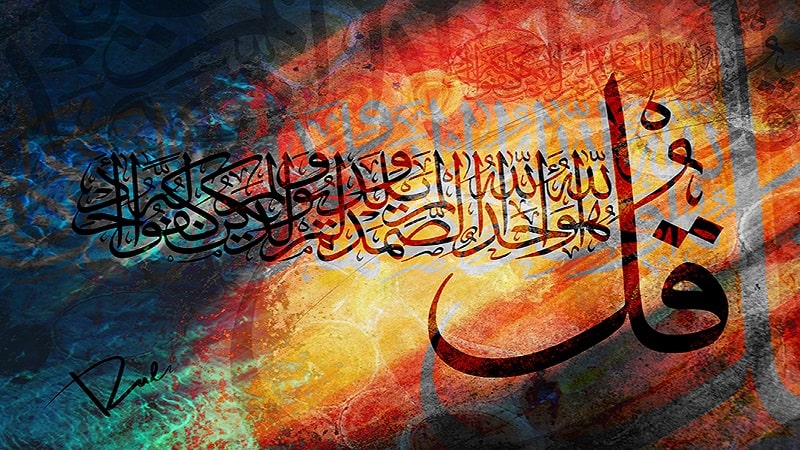

The true place of intellection in our lives
Have you ever thought about which among the thousands of blessings Allah granted us is the most significant? It is not an easy task, but if you carefully think about it, you may guess the answer.
As our dear Prophet (PBUH&HP) said (1), the greatest blessing is intellect. Through this remarkable gift, humans have been recognized as the pinnacle of all creations, even angels bow ed down to him expect for Satan. Let us even think about this matter rationally, setting aside religious teachings . Throughout history, the inherent power of humans against wild animals has not primarily been their physical strength or survival capabilities in harsh natural conditions.
Instead, it's their intellect that empowers them to create weapons and shelter, making them the most resilient species on Earth.
Our great Prophet and dear Imams (PBU Them) have consistently mentioned that intellect is one of humanity’s paramount gifts that must be integrated into our lives. Even the Holy Quran has numerous verses about intellect and wisdom, beautifully highlighting their profound importance. If you read the Holy Quran frequently, you have likely seen the words like “They are reasoned” or “They are contemplating” in many verses. These instances underscore how dearly Islam values intellect and stresses its role in our lives. Let’s now explore some verses here that show us the significance of intellect:
[This is] a blessed Book that We have sent down to you, so that they may contemplate its signs, and that those who possess intellect may take admonition.
(The Holy Quran 38:29)
They ask you concerning wine and gambling. Say, ‘There is a great sin in both of them, and some profits for the people, but their sinfulness outweighs their profit.’ And they ask you as to what they should spend. Say, ‘All that is surplus.’ Thus does Allah clarify His signs for you so that you may reflect
(The Holy Quran 2:219)
Indeed, We have sent it down as an Arabic Quran so that you might understand . (The Holy Quran 12:2)
Is he who supplicates in the watches of the night, prostrating and standing, apprehensive of the Hereafter and expecting the mercy of his Lord...? Say, ‘Are those who know equal to those who do not know?’ Only those who possess intellect take admonition.
(The Holy Quran 39:9)
The Prophet (PBUH&HP) stated “The good of this world and the hereafter lies in knowledge, and the evil of this world and the hereafter lies in ignorance.” (2)
Imam Sadigh (AS) said “I wish to see none of you [Shias] but in two categories: a scholar or a student.” (3)
Imam Ali (AS)proclaimed “Indeed, knowledge is the lifeblood of hearts, enlightening blinded eyes and empowering incapacitated bodies.” (4)
References:
- Allah (SW) has not created anything better for man than reason .
- Bihar al-Anwar (79th Volume – page 170)
- Al-Amali Tousi (Page 303)
- Tuhaf al-Uqul (page 28)
Share This Article

4 Points Proving the Quran to Be a Miracle
Prophethood is a sublime status granted only to those who are chosen. A prophet deals with the heart and souls of humans; it is, therefore, a delicate matter to believe in the one who claims prophethood. Hence, there should be a sign that lets people recognize a real prophet from a fake one; that's "miracle." A "miracle" is an extraordinary act or event that no other human, from the first to the last, can perform it or cause it to happen, except a prophet. It can be neither explained by natural or scientific laws. For Prophet Muhammad (PBUH&HP), the Quran is known as an everlasting miracle that is the most outstanding of Prophet's (PBUH&HP) miracles. The question is: why the Quran is considered as a miracle? Let's find out the reasons.
1. The Quran Is Unique in Style and Inimitable
The Quran is revealed with great eloquence and fluency to convey the message. Precise, poetic, targeted, and meaningful terms used in the Quran are such that no weakness of expression can be found in any of its Ayats. In fact, the words are chosen such that they express the desired meaning in the best way possible (Fasaha) with the minimum usage of words (Balaqa). And, these are features that scholars of Arab literature have noticed in every chapter of the Quran [1].
What makes the Quran a miracle in this regard is that, until the present, no one has been able (and no one will be able) to bring even one short Surah similar to that of this holy book. A Surah that could express the highest scientific facts in simple, comprehensible words and describes different aspects of a scientific matter as clearly as possible. This is an issue that has already been addressed in the Quran: "And if you are in doubt concerning what We have sent down to Our servant, then bring a Surah like it, and invoke your helpers besides Allah, should you be truthful." (2:23). There is no historical account of those who succeeded in defeating this claim of the Quran. If there existed any, those who have always challenged the origin of the Quran should have recorded it.
2. The Quran has been Brought by a Prophet Who Was Uninstructed (Ummi)
According to both historical records and the Quran, Prophet Muhammad (PBUH&HP) was Ummi before he was chosen as a messenger of Allah Almighty; he hadn't been taught by any teacher to read and write 1]. "You were not able to read or write before the Quran was revealed to you; however, the followers of falsehood would have tried to confuse the matter" (29:48). Therefore, the Quran that its words are in extreme eloquence and fluency and reveal sophisticated concepts cannot be Prophet's (PBUH&HP) word. Hence, it is a divine work gained through revelation, a "miracle."
3. Scientific Facts Revealed by the Quran
The Quran is not a book of science or a specialized book, nor has it aimed to concentrate on scientific facts. However, these kinds of information are stated in the Quran to demonstrate the wonders of creation and Allah Almighty's glory.
In this regard, the creation of humans is described in detail in the Quran (23:12-14). In the first step, the human being was fashioned from clay. Other measures include the creation of man from spurting water, a drop of semen, the sperm fashioned into an embryo, this embryo fashioned into a shapeless lump of flesh. From the lump of flesh, fashioned bones, clothed the bones with flesh and then created the consanguinity and affinity [2].
The movement of the earth is another fact mentioned in the Quran: "It is Allah who raised the heavens without any pillars that you see" (13:2). In this verse, it is mentioned that there exist invisible supports that raise up the heavens. These supports are now referred to as the gravitational and other unseen forces in the universe. This scientific fact that is valid today was unknown in that era, and even one thousand years later when Galileo explained this fact and was sentenced to death. That's why it is not explicitly stated in the Quran; otherwise, it would have been banned [1].

4. Accurate Predictions
Some accurate predictions are among the verses of the Quran. This proves that it has been descended from an absolutely knowing source that can report the unseen.
As an example, in the time of Prophet Muhammad (PBUH&HP), Mecca was controlled by polytheists for a while. They did not let Muslims enter the city and do the Hajj rituals. Then, Prophet (PBUH&HP) dreamed that he succeeded in performing Hajj with his companions. This was confirmed in an Ayah: "Certainly Allah has fulfilled His Apostle's vision in all truth: You will surely enter the Sacred Mosque, God willing, in safety, with your heads shaven or hair cropped, without any fear." (48:27). In the next year, this dream came true.
In another case, the Quran has predicted that: "Byzantium has been vanquished in a nearby territory, but following their defeat, they will be victors in a few years." (30: 2-4). Some years later, both predictions came true.
From what has been discussed above, it can be deduced that the Quran cannot be written by a human being. It is undoubtedly from a superior all-knowing all-wise source, which is Allah Almighty. Consequently, the Quran can be considered as one of Prophet Muhammad's (PBUH&HP) miracles, the greatest one, of course.
References:
- Quran
- H. El-Ramady, et al., "Soils and Human Creation in the Holy Quran from the Point of View of Soil Science," Env. Biodiv. Soil Security, vol. 3, pp. 1- 9, (2019).
Read More

Afterlife
As other axioms, the afterlife (Ma’ad) is one of the first requisites for stepping into the religion of Islam and is defined as the existence of another world that creatures enter after their death, where they experience eternal life. It is noteworthy that the belief in receiving revelation and prophethood (Nubuwwah) builds the foundation of this axiom; in other words, one cannot find acceptance in the afterlife unless he comes to faith in prophethood and more importantly, monotheism (Tawhid).
Nevertheless, prophets didn’t come to impose the idea of Ma’ad on their followers, rather led people’s mind to ponder on this issue and recognize its validity. The reason for this concept to be considered as an axiom is that Islam not only wants us to have faith in the afterlife dependent on the belief in prophethood but also through individual and conscious investigation.
How to Find Faith in the Afterlife?
Aside from revelations that prophets received, there are some other ways and proofs for coming to believe in the afterlife which is the result of the intellectual and scientific efforts of human beings, including the knowledge of God, the universe, and human soul. Here we will briefly introduce each of these ways.
1. God’s Attributes
This argument which is based on the axiom of monotheism (Tawhid) -God exists and is the only one and should be accepted through rational thinking -, claims that God cannot be considered perfect and wise unless we believe in the existence of a world beyond this material world, an afterlife. In other words, without afterlife, the whole creation will become meaningless and vain.
If we find a wisdom governing the universe, then it necessitates the existence of another world which complements creation and forms a part of it. But why? We justify this issue based on God’s attributes.
Divine Justice
God is just and has built the foundation of the universe, heaven, and earth on Justice. Human’s life, also, is placed within this just order; therefore, God’s justice requires every creature to be endowed with what they deserve in order to avoid denying their right.
The reward of many good deeds is not obtained in this world, just as many sins that cannot be punished thoroughly during this earthly life. Accordingly, since this world is limited and does not have the capacity to provide human beings with their deserved rewards or punishments, another world with infinite and unlimited time must exist in order to make up for the rights that people have not acquired in this world.
Divine Wisdom
Wisdom is attributed to one whose deeds are always purposeful and would result in a specific and clear goal. Therefore, the wise God does not commit any absurd or nonsensical deed, otherwise, his action would be the result of his ignorance and lack of knowledge.
Moreover, the creation will not be meaningless, if it leads to eternity; if the creatures have been created for eternity and permanent endowment from God, then it shows an existence – as opposed to nothingness, inexistence – and continuity, thus it would not be absurd.
In addition, he has created every creature for a special purpose and has provided them with the means of reaching it. If He has endowed them with certain desires and capacities, then surely He has anticipated the appropriate answer for them, too.
For instance, in response to the urge for thirst or hunger in animals, He has created water and food in order to satisfy this need of them. Similarly, He has bestowed upon human beings the desire for immortality and eternal perfections; most of us feel the urge for eternity and unending life, as well as everything good in its best way.
If there were no way of reaching these desires, then why would God have placed them in human beings? These feelings do not fit into this earthly life and cannot be satisfied here; our All-wise God has for sure devised a plan for mankind to fulfill these needs, that is creating a world where they are able to experience everlasting life and achieve what they long for in their perfect forms.
2. Universal Phenomena
Looking around, we can find many instances that remind us of the Resurrection and the revival of human beings in the afterlife. The very first thing that comes to mind when we think about the creation of the universe, is that the same power and wisdom that has created this world also has the power and ability to create another one. When we compare this power to our own capabilities, the occurrence of the afterlife seems far-fetched, however by the omnipotent being who has brought this world into life, this act is not at all infeasible.
Moreover, we are faced with many incidents in this world, on a daily basis, which is fairly similar to what will happen in the afterlife; we have seen them so many times that we have got used to their happening and consider them typical and insignificant, however at a closer look, we can find out the systematic and repeated order that governs the universe.
We constantly experience the cycle of life and death in nature with the change of seasons, that with the coming of winter and autumn everything - trees, flowers, etc. - on earth seems to be dying, and by spring, the sky sends its drops of rain to awake the hibernating earth and bestows a new breath on it.
Considering God’s power, the afterlife thus is neither impossible to happen nor something beyond our understanding or illogical based on the events that take place in the universe.
3. Human Being’s Soul
What we as human beings consider as our “self” or “I” is in fact a fixed and permanent fact. This “I” is actually the soul in mankind which is an immaterial and unchanging reality and has every action of the body under its control.
The axiom of the afterlife cannot be accepted unless one has a belief in the existence of a soul in human beings independent of their body, which is responsible for their conscious choices and deliberate actions. Otherwise, the belief in the afterlife is not possible, since if we see human beings as only this body that would be destroyed and diminished by death, then we cannot expect them to be revived exactly as the same; the human being that will be brought to life again would be for sure a different creature.
The only valid assumption would be that when a person dies his soul continues to exist until it returns to the body. Accordingly, the issue of the afterlife is justifiable through the knowledge of the human being’s reality which leads us to consider him as an immortal and infinite being.
Furthermore, as it was mentioned above, human beings are endowed with certain capacities - desire for immortality, to have eternal perfections - which are not fully compatible with the characteristics of this world and require another world for their fulfillment. If there were no resurrection for human beings, then his creation would be pointless from the very beginning, since his perfection has not manifested itself in this world and the means of receiving this goal would become useless and in vain.
To conclude, the aim of creation is going back toward God and to attend His final judgment among His creatures on Resurrection Day; everything in this world has been created to return to its God, reach eternity and never fail to exist.
They have come to life in order to pursue the path to their perfection and ultimately join God Almighty. It is noteworthy that the afterlife is not considered as dependent and the result of this world, but rather as a necessity and introductory for this earthly life; God has created this Universe, especially human beings with their extraordinary capacities - the power of the mind, the urge for seeking God and joining Him, etc.-, for becoming immortal in the afterlife and reaching the summit of their capabilities and eternal bliss; thus this world only provides the ground for the ultimate goal of creation. Afterlife is the final destination of creation and this world is only a temporary dwelling.
Read More

